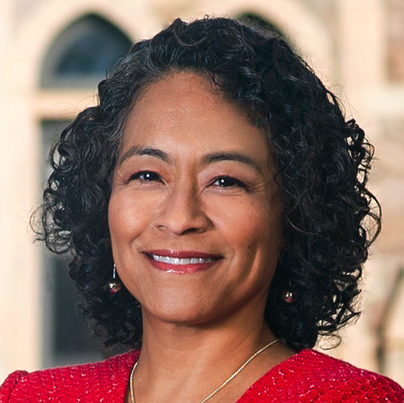Any newfound appreciation for educators, who help to keep children connected to the mission of learning during the pandemic, is a welcome development. Many teachers have been a steady presence, whether in-person or online, yet the majority of America’s public school children won’t see themselves reflected in their teachers.
About 14% of Americans are Black, but only 7% of public school teachers are, and only 2% of public school teachers are Black men. Black educators have an incredibly positive, measurable effect on the lives of young Black students. When kids see teachers who look like them, they perform better academically. Seeing themselves reflected in the people they look up to opens their minds to new learning and career possibilities.
The National Bureau of Economic Research released a study on the long-term positive effects of same-race teachers. A key finding was that “Black students randomly assigned to at least one Black teacher in grades K-3 are 9 percentage points (13%) more likely to graduate from high school and 6 percentage points (19%) more likely to enroll in college than their same-school, same-race peers [who did not have a Black teacher].”
Instead of making progress in 2021, however, we are falling further behind. Educated Black Americans found more opportunities to work as teachers when schools were still segregated in the first half of the 20th century than they do today. The Brown v. Board of Education decision was a landmark victory in the civil rights struggle, but once schools were fully integrated and the school administrators placed in charge of the hiring, decisions were almost exclusively white. Opportunities for Black educators started disappearing.
De facto segregation continued, and the number of educated Black Americans who work as teachers has been in decline for the last several decades. To this day, the teaching profession in America remains largely white and mostly female. It’s been the case for decades.

Effie Stroud, who originally inspired Henry Sachs to create a foundation to fight racial inequity in education for Black students in Colorado, graduated from Colorado College in 1931 with top marks and an ambition to become an educator. But no Colorado Springs schools, which were integrated, would hire a Black teacher. So, despite having the training, talent and desire, she was never able to work inside a classroom.
The persistent racial wealth gap also contributes to the Black educator shortage by discouraging talented Black students from pursuing careers in education. Since Black Americans face twice the average student debt load than their white peers face, exceptional Black students tend to gravitate toward careers in business and engineering.

Understandably, Black students are looking for work with higher income potential so they won’t be crushed by debt, even if they are interested in careers in education.
Gender stereotypes contribute to the shortage of male teachers in general, including Black male teachers. For many decades, teaching was one of the few professions open to educated women, so teaching began to be perceived as “women’s work” across all races, with a corresponding decline in pay and prestige. Black men who are interested in teaching have to overcome gender stereotyping and obstacles like a higher loan burden, which discourages many Black men from pursuing a teaching career.
How the public can help fix the Black teacher shortage
Colorado College and the Sachs Foundation are committed to directly addressing the Black educator deficit through the recently established Teacher Development Program, but broader, national action is needed at the policy level, such as federal, state, and local government programs to fund higher pay for educators.
Also, public school administrators need to be intentional about hiring a diverse faculty, particularly Black teachers, because Black students directly benefit. And they must make retention of Black teachers a top priority because too many leave the field.
School administrators can make teaching jobs more attractive to Black applicants, particularly Black men, by providing training for faculty to help them understand the unique challenges these educators face and ways to mitigate the difficulties. Since Black teachers, especially men, are underrepresented and therefore often feel isolated on the job, districts can provide networking opportunities that enable Black teachers from multiple schools and districts to build supportive communities.
The rest of us can do our part too. Parents can encourage administrators at their local schools to hire Black educators. Citizens can vote in every school board election, evaluating candidates who will ultimately control local education budgets to ensure they understand the problem and are committed to solving it. And we can all encourage Black youth, especially Black boys, to aspire to a career in education.
It’s important to take these steps because the research is clear: Black teachers matter.
How Colorado College and the Sachs Foundation are addressing the Black educator deficit
Fixing the Black educator deficit will require addressing all of the factors that contribute to it. Colorado College and the Sachs Foundation partnered two years ago to formulate ways to address the issue in Colorado. As a result of that effort, the Sachs Foundation, in partnership with Colorado College, recently launched a Teacher Development Program to identify Black undergraduate students who are open to a career in education and remove barriers that keep Black educators out of classrooms.
The program provides summer fellowships, funding for educational internships and full tuition for graduate studies or other certifications needed to become a licensed teacher. Once students are certified, the program provides a $10,000 annual stipend to supplement teachers’ salaries for their first three years if they teach in Colorado schools, preferably a Title I school. Black teachers who take full advantage of the program can receive more than $100,000 in funding from the Sachs Foundation.
The response has been encouraging. Black students can participate in the program regardless of whether they have previously taken an education class at Colorado College, and the program has attracted students from multiple disciplines across campus.
Even with the challenges of launching the program during a pandemic, students were identified and placed in internships this spring, and this summer, students participated in personal development and mentorship activities. Through the program, Colorado College has formed community partnerships with other organizations that prioritize equity work and increased Black student enrollment in education classes. The Sachs Foundation plans to grow the program with additional institutional partners in Colorado, with the goal of investing over $1 million in the program over the next three years.
L. Song Richardson is president of Colorado College and Ben Ralston is president of the Sachs Foundation.







